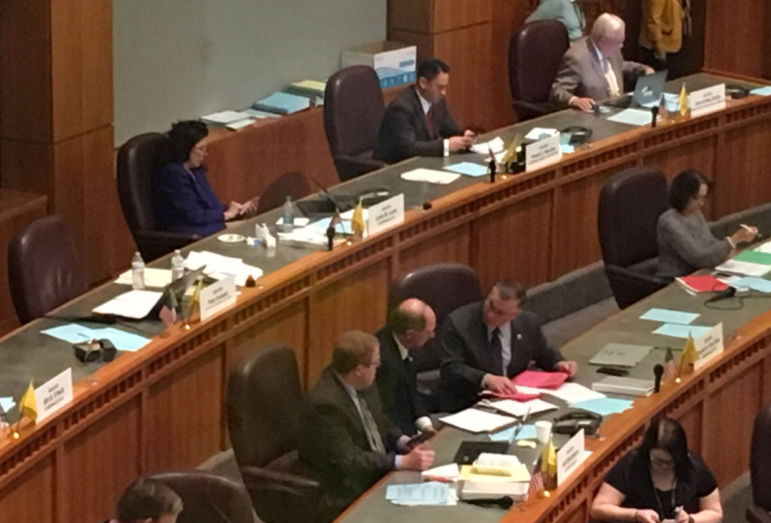
Rep. Jim Dines and Sen. Daniel Ivey-Soto confer on the Senate floor Tuesday afternoon. Photo by Sandra Fish.
State lawmakers would have too much power to decide who sits on an independent ethics commission under a proposal now being considered by the state Senate, a watchdog organization said Tuesday.
New Mexico Ethics Watch, which leveled the criticism, disliked that the would-be commission in the proposal would not have sole authority to investigate and prosecute ethics complaints.
“While it is important that the state have an Ethics Commission, it is more important that an Ethics Commission be properly constituted and protected from future meddling,” Ethics Watch Executive Director Douglas Carver said in a press release. “The version of the constitutional amendment creating an Ethics Commission that is before the Senate now is significantly flawed.”
New Mexico Ethics Watch, founded last year, is a non-partisan organization dedicated to promoting ethics and accountability in government and public life in New Mexico. Prior to Ethics Watch, Carver worked for five years as a staff attorney for the New Mexico Legislative Council Service, which included working with the Legislative Ethics Committee. He also served on two impeachment subcommittees formed by the House of Representatives.
Ethics Watch’s criticism came midday Tuesday as uncertainty clouded whether New Mexico might move a step closer to joining most U.S. states in creating an independent ethics commission.
In a sign of that uncertainty, the authors of competing ethics commission proposals, Republican Rep. Jim Dines and Democratic Sen. Daniel Ivey Soto, both of Albuquerque, met to determine if they could find enough common ground to work together. Both their proposals are scheduled to be heard Wednesday by the Senate Rules Committee, a perennial stumbling block to ethics commission legislation over the past decade.
At the center of Ethics Watch’s critique were changes made to Dines’ proposal, House Joint Resolution 8, by the House Judiciary Committee a week ago. That version passed the House of Representatives unanimously last week. If the Senate were to pass HJR 8 unchanged, New Mexicans would be asked to amend the state constitution to create an independent ethics commission during the 2018 general election.
Ethics Watch said who selects members of the independent ethics commission is a major concern.
Dines’ original version of HJR 8 authorized the governor to appoint three of seven commission members, with Democratic and Republican leaders in the Legislature appointing the other four.
House Judiciary Committee amendments altered that math, however, with the governor authorized to appoint one member and Democratic and Republican leaders in the Legislature appointing four. The four commission members appointed by legislative leaders, in turn, would appoint the panel’s sixth and seventh members.
“The House has shifted the power of the commission drastically towards the Legislature,” the Ethics Watch press release said. “Six of the seven members of the commission are appointed through the Legislature, and the commission requires five members to agree in order for the commission to act. This is a recipe for deadlock and ineffectiveness.”
Dines, however, said he was comfortable with the new system by which commission members would be appointed.
“We thought it was a good balance,” Dines said.
Ethics Watch also took issue with a decision by the House Judiciary Committee to delete language in HJR 8 giving the independent ethics commission sole authority to investigate and prosecute ethics complaints.
Currently, several state agencies conceivably could prosecute such cases, which leads to confusion. Reformers and advocates believe centralizing the investigative and prosecutorial functions under an independent ethics commission would be an improvement.
”The House has stripped out all of the commission’s jurisdiction. Jurisdiction will be determined in future legislation by the Legislature,” Carver said in the Ethics Watch press release. “The principal reason to have an Ethics Commission enshrined in the state’s Constitution is so that its jurisdiction cannot be easily tampered with. This protection no longer exists.
But Dines said the Legislature would come together after the constitutional amendment passes to work on and pass legislation that would set up the independent ethics commission. One of the details would be whether to give the commission sole authority to investigate or prosecute ethics complaints, he said.
If it’s in the constitution, it would be difficult to undo if legislators discovered that wasn’t the best system, Dines said.
The Legislature has 3 1/2 days left in the legislative session to pass the ethics legislation, with the Senate Rules Committee appearing likely to reprise its role as an important decider on what happens.